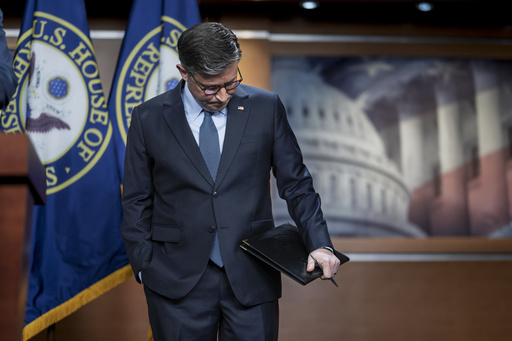WASHINGTON — President-elect Donald Trump unexpectedly dismissed a bipartisan initiative aimed at averting a government shutdown during the Christmas period. This decision came as he instructed House Speaker Mike Johnson and fellow Republicans to renegotiate their plan just days before the deadline for federal funding, creating chaos within Congress as lawmakers attempted to finalize their work before the holiday break.
Trump’s sudden involvement in the negotiations introduced new demands that left Johnson in a tight spot, working late into the night at the Capitol to devise an alternative plan before the funding deadline on Friday. In a statement, Trump and Vice President-elect JD Vance urged Republicans to adopt a more strategic and stringent approach.
The president-elect proposed a combination of some continued government funding along with a highly debated measure to raise the national debt limit, which his own party has often opposed. They asserted, “Anything else is a betrayal of our country.” The abrupt reversal incited criticism from Democrats, who sourced the turmoil to the GOP’s stance on the interim funding measure, which included approximately $100.4 billion in disaster relief for states affected by recent hurricanes.
House Democratic Leader Hakeem Jeffries condemned the Republican blockade, claiming that it would harm ordinary Americans across the nation. He firmly stated, “An agreement is an agreement,” and emphasized that House Republicans would be responsible for any consequences arising from their withdrawal from the deal.
The expansive 1,500-page proposal was on the brink of disintegration, as hard-right conservatives rejected the increased budget allocations encouraged by Trump’s billionaire associate, Elon Musk, who swiftly disapproved the plan following its introduction.
Concerns were raised by several lawmakers regarding additional provisions in the bill, including their first pay raises in over ten years—an unexpected outcome after a notably disorganized legislative session. The inclusion of essential disaster relief funds and economic assistance for farmers also failed to sway budget-conscious Republicans, many of whom awaited Trump’s direction on how to vote.
Musk expressed his disapproval on social media, stating, “This should not pass.” Lawmakers like Rep. Andy Barr, R-Ky., voiced concerns over the influx of calls from constituents, indicating that public opinion was heavily influenced by Musk’s position.
This situation is not unexpected for Johnson, who, like previous Republican House speakers, has struggled to align his party with routine governmental operations while wanting deeper cuts. In an attempt to resolve the matter, he held discussions late into the night with GOP members, joined by Vance and his young son.
Their interactions indicated a shared determination to navigate these negotiations, with Vance stating, “I think we’ll be able to solve some problems here.” This political crisis underlines the challenges Republicans will face as they prepare to take control of the House, Senate, and White House next year, all while needing Trump’s endorsement to push any legislative initiatives.
Musk, who will lead Trump’s new Department of Government Efficiency, issued a pointed warning: “Any member of the House or Senate who votes for this outrageous spending bill deserves to be voted out in two years!” This firm warning from Musk, one of the wealthiest individuals globally and a significant supporter of Trump, poses a serious threat to the political careers of legislators.
Democratic Representative Jamie Raskin of Maryland highlighted concerns of an oligarchic influence, expressing disapproval over the overarching sway of a few wealthy entities over politics.
Across Capitol Hill, bipartisan senators observed the distressing developments, with Sen. Josh Hawley, R-Mo., questioning whether this would be the new norm in legislative operations, attributing blame to Johnson.
Generally, Democrats who originally negotiated the bill with Johnson and Senate GOP leaders will be expected to assist in its passage, which often occurs in major bipartisan efforts. White House Press Secretary Karine Jean-Pierre urged Republicans to abandon political games, yet Trump’s latest demands regarding the debt limit pose a considerable challenge for Johnson.
After affirming his intention to raise the debt ceiling, Trump expressed his determination, stating, “I will fight ’till the end.” With the nation’s debt limit set to expire in 2025, Trump aims to address the issue prior to his anticipated return to the presidency—a goal that proves complex for negotiations.
The previous House speaker, Kevin McCarthy, took months to collaborate with President Joe Biden on raising the debt limit, and although an agreement was made, dissatisfaction among House Republicans ultimately jeopardized McCarthy’s position. Presently, Trump seeks Johnson’s cooperation to pass a debt ceiling extension just 48 hours before a potential government shutdown.
This bipartisan measure that Trump rejected would have extended existing government programs at their current funding levels until March 14, 2025. The proposal aimed to address funding shortfalls stemming from Congress’s failure to enact appropriations for various federal departments essential to national operations.
Yet, the extensive bill also included additional provisions, such as federal support to rebuild Baltimore’s Francis Scott Key Bridge and the transfer of the site of the old RFK Stadium to local officials, possibly facilitating a new venue for the NFL’s Washington Commanders. However, Rep. Anna Paulina Luna, R-Fla., criticized the bill, labeling it a “junk sandwich.”
Finally, the proposed legislation would lift the pay freeze for Congress members and permit a potential pay increase of 3.8%, equating to approximately $6,600 in 2025. This adjustment would elevate the annual salary for lawmakers to $180,600, marking the first pay raise since 2009.



